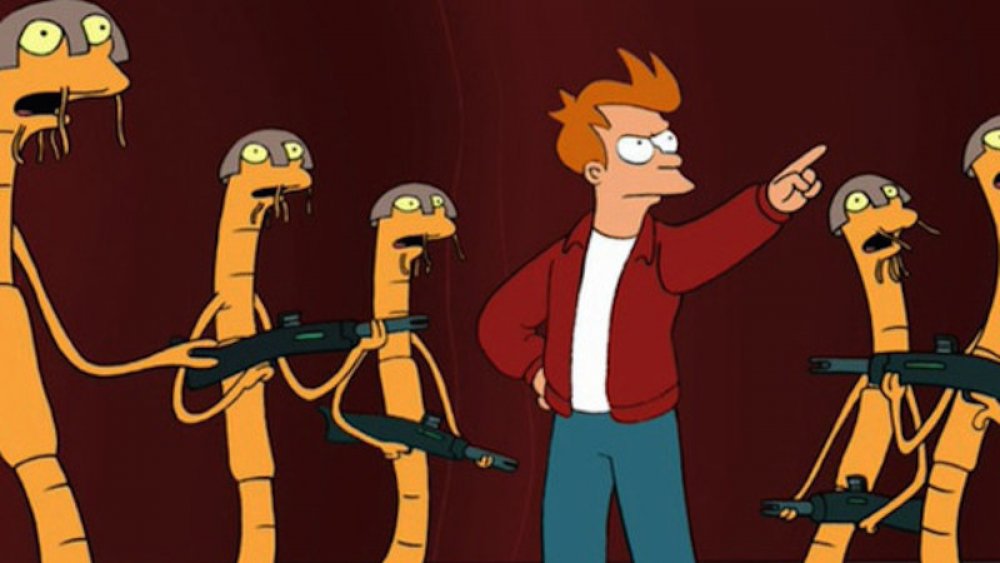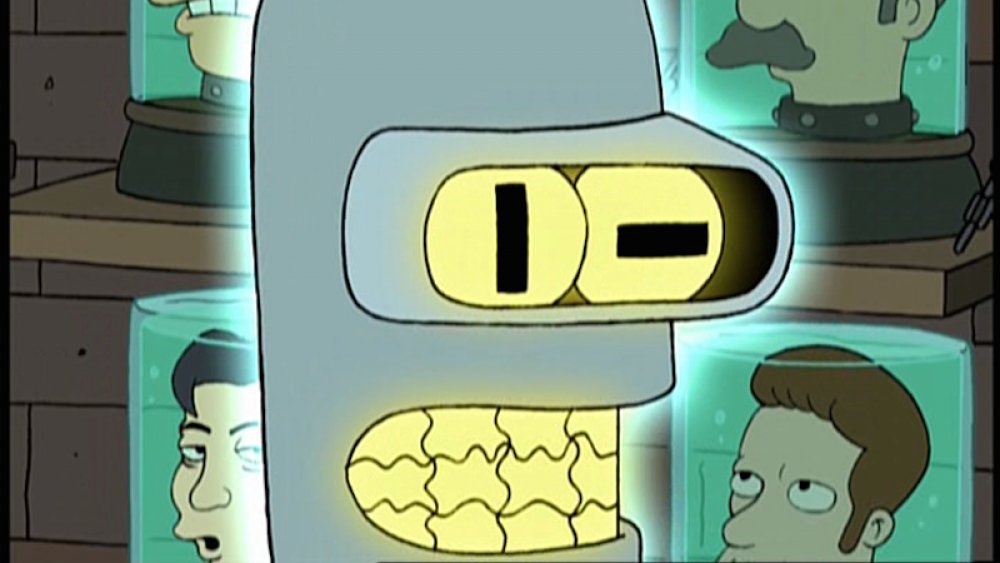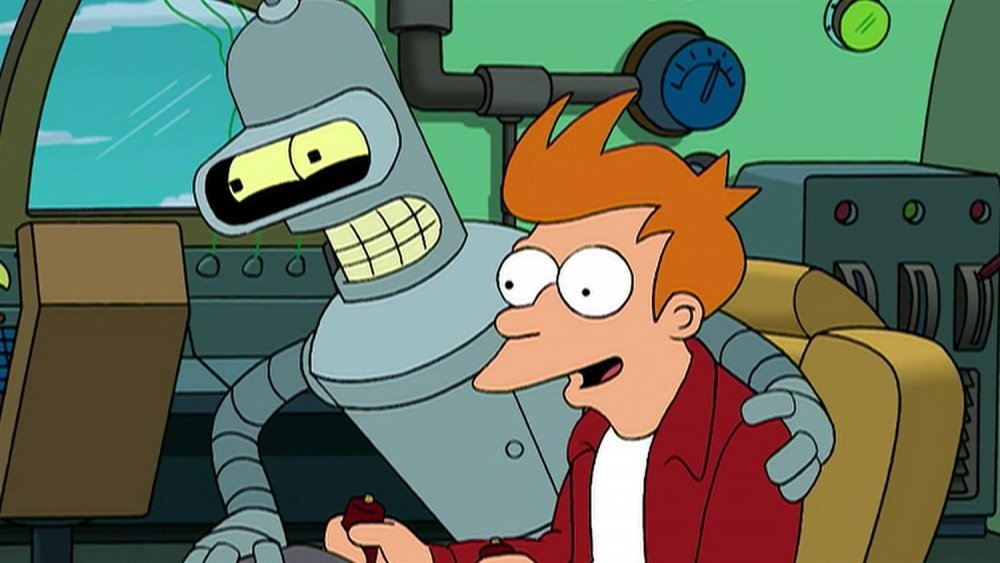The Darkest Futurama Theories We Hope Aren't True
While creator Matt Groening is best known for another little animated series he started working on in the '80s, many fans would argue that Futurama is his true magnum opus. The show was, if you'll pardon us, truly ahead of its time; maybe that's why it was canceled, then revived, then canceled all over again. Before there was Rick and Morty (another show that spawned a bunch of dark theories), Fry (Billy West), Leela (Katey Sagal), and the rest of the Planet Express crew were gallivanting around the universe on high-concept, sci-fi adventures, lampooning everything from timeless touchstones of popular culture to mainstream network sitcoms.
Just like that other little Groening project, The Simpsons, Futurama is often much smarter than it might appear at first glance. Given Groening's propensity for cryptic references, Futurama fans' reciprocal propensity for over-analyzing symbolic minutiae, the proliferation of dark theories since the show's 2013 swan song should have probably been expected. The crazy thing isn't the existence of these theories, but rather the fact that they start to seem kind of plausible the deeper you dive into the evidence.
So, you think you're ready to ride the Planet Express ship into this wormhole? Here are some of the darkest Futurama fan theories that you'll never be able to unlearn.
Fry's worms left a lasting impression
On the second episode of season 3, entitled "Parasites Lost", Fry's legendary appetite gets the better of him. The dimwitted delivery boy gets down with a questionable sandwich from a space gas station (over Leela's objections, we might add), and predictably, he finds his insides crawling with parasitic worms. Fortunately for Fry, these worms aren't concerned with causing indigestion and diarrhea; instead, they immediately get to work establishing a society and improving their host body.
The worms tone Fry's muscles, turning him into a shredded Adonis, and wire new synaptic connections in his brain. Their work bestows the lowly delivery boy with super intelligence and the ability to play the maddeningly difficult holophonor — a musical instrument that projects holographic images when expertly played. The new Fry even catches Leela's eye, though he ultimately becomes concerned that Leela only loves him for his parasites. In true Futurama fashion, Fry is cured of his helpful parasites by the end of the episode, but one fan theory suggests this wasn't the end of the story — at least, not for Fry.
According to this dark theory, the parasites left a hole in Fry's soul — the understanding of his true potential. Proponents of this theory argue that you can see a marked change in Fry's behavior from this point in the series on. Forever haunted by the brief glimpse of personal success that the parasites offered, Fry becomes less irresponsible and more committed to self-improvement to make himself once again worthy of Leela. The last scene of the episode lends some credence to this theory; in it, Fry is seen sitting by himself with a holophonor, attempting a rudimentary melody that projects a sloppy portrait of Leela. Sad story, since Fry never again achieves the heights of success afforded him by the worms.
Bender went insane in the mainframe during the pilot episode
If you've only seen a few episodes of Futurama here and there, you might have a hard time imagining that Bender Bending Rodriguez (John DiMaggio) was ever anything other than the foul-mouthed, beer-swilling, flatulent robot that we've all come to know and love. But what if that roguish personality on display for 139 of the show's 140 episodes was nothing more than a run time error?
According to one disturbing theory, Bender just wasn't the same robot before his happenstance meeting outside the suicide booth with Philip J. Fry. When the two future roommates first met in the pilot, they were both on the verge of dying by suicide — Bender by intention, and Fry by mistake. We learn in the course of their meet-cute that Bender used to help make suicide booths by bending the metal girders used in their construction.
This mellow, blue collar bending robot willing to take his own life out of shame for the moral repugnance of his profession bears almost nothing in common with the Bender who signs up to crew Professor Farnsworth's delivery ship. So, what changed?
Apparently, it has something to do with a sudden electrical accident in the Museum of Criminals (via Scare Normal). Bender has a major personality reversal after being electrocuted by a faulty wire. After the shock wears off, Bender takes an amoral turn against his primary programming. Why the new personality? As the theory goes, the shock rebooted Bender's mainframe, and the fact that he was standing in the Museum of Criminals at the time had a lasting effect on his personality directives.
We actually see this process play out on a later episode when Bender is rebooted as a result of trauma from a killer whale attack. That reboot makes Bender act like a penguin, suggesting that his surroundings at the time of reboot actually do impact his personality algorithm.
A dark explanation for the characters' youthful appearances
For we mortal souls, a healthy diet, regular exercise, a low baseline level of stress, and some good ol' anti-aging skincare products are pretty much all we can rely on when trying to maintain our outward youthfulness. Time eventually wears us all out and gravity pulls everything downward in the end, but that's seemingly not what the characters of Futurama experience. The series begins with Fry at age 25 and wraps with him pushing 40 — and yet, he looks basically the same throughout, save for the e episode "The Late Phillip J. Fry," where we see him and others in their old age.
So what gives? Why don't our Futurama friends appear to age? One fan theory posits a dark explanation: the Planet Express Ship produces anti-aging radiation.
A user on Reddit (who has since deleted their account) detailed the thought process that led them to this conclusion. On the third episode of Futurama's first season, Fry gets "a huge dose of radiation" when he flicks on the Planet Express Ship's jets for just a few seconds. They went on to argue, "I believe that prolonged exposure to the ship's radiation prevents aging. The radiation is so large, it affects the people you are in close quarters with, like Dwight and LaBarbara Conrad."
The Futurama fan theorizes that dark matter used to make the Planet Express Ship's reactors "omits the radiation that keep people from aging." This would also explain why Mom (Tress MacNeille) and her sons don't get any older – because they "own a dark matter producing company" — and why "the Niblonians are able to be so old, they literally s*** dark matter, it stays inside [their] system."
This theory-crafter went on to state that Professor found out how to "convert the ship to whale oil, and still have all the normal functions (including this radiation)." While others still obtain the radiation in "very small doses from other accessible dark matter areas," the Professor "excludes and multiplies it" on the Planet Express Ship.
Zapp Brannigan has PTSD
Zapp Brannigan is one of the most memorable secondary characters on Futurama. When the bumbling starship captain was first introduced, he was little more than a one-dimensional, self-aggrandizing buffoon — a bloviating satire of characters like William Shatner's James Kirk, original captain of the Starship Enterprise. That all changes on subsequent episodes, however, as the character accrues significant depth across several intersecting missions with the Planet Express crew.
This dark theory weaves together several disparate pieces of Brannigan's slowly unfolding backstory into a tapestry of woe. First, bear in mind that Brannigan has a significant amount of authority for someone who seems as incompetent as he has demonstrated himself to be. It's simply implausible to imagine an officer this useless climbing the military ranks to such heights. We have to consider the possibility that Brannigan was once a better officer than he is typically portrayed as.
According to Zapp himself, his crowning military achievement came when he vanquished the Killbots by making the decision to send every single one of his soldiers into battle simultaneously, thus overwhelming the Killbots' programming. Such a gutsy surge tactic likely came with substantial human casualties, a cost that this theory suggests has haunted Zapp ever since.
Tortured by the post-traumatic stress induced by this incident, Zapp has been driven to alcoholism, cowardice, and lechery. His feigned incompetence is all a ploy to secure a discharge from service. That empty space suit who spends all his time fawning over Leela? That man is just a shell of his former self — hollowed out by the horror of the military decisions he made in a moment of grave importance.
It's hard to laugh at a serious psychological disorder like PTSD, so we really hope this theory isn't true, but we'd be lying if we said it doesn't make a lot of sense. Of all the Futurama fan theories out there in the multiverse, this one is definitely the darkest.




